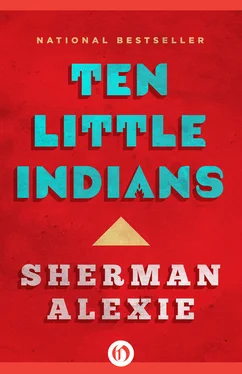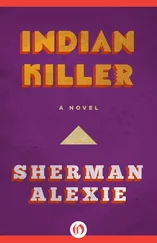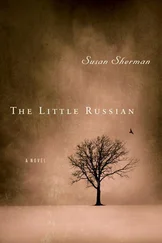“I guess I don’t. Have you looked him up on the Internet?”
“How do you know about the Internet?”
“I’m old, Corliss, I’m not stupid.”
“Oh, jeez, Mom, I’m sorry. I don’t mean to be such a jerk. It’s just, this book, is pretty cool. It’s getting me all riled up.”
“It’s okay. You’re always riled up. I love that about you.”
“I love you, too, Mom. I got to go.”
“Okay, bye-bye.”
Corliss hung up the telephone, grabbed her backpack and coat, and hurried to the campus computer lab. She was too poor to afford her own computer and was ashamed of her poverty. Corliss talked her way past the work-study student who’d said the computers were all reserved by other poor students. She sat at a Mac and logged on. Her user name was “CrazyIndian,” and her password was “StillCrazy.” She typed “Harlan Atwater, Native American poet, Spokane Indian” into the search engine and found nothing. She didn’t find him with any variations of the search, either. She couldn’t find his book on Amazon.com, Alibris.com, or Powells.com. She couldn’t find any evidence that Harlan Atwater’s book had ever existed. She couldn’t find the press that had published his book. She couldn’t find any reviews or mention of the book. She sent e-mails to two dozen different Indian writers, including Simon Ortiz, Joy Harjo, Leslie Marmon Silko, and Adrian C. Louis, and those who responded said they’d never heard of Harlan Atwater. She paged through old government records. Maybe he’d been a criminal and had gone to prison. Maybe he’d been married and divorced. Maybe he’d died in a spectacular car wreck. But she couldn’t find any mention of him. The library didn’t have any record of where or when the book had been purchased. The Spokane Tribal Enrollment Office didn’t have any records of his existence. According to the enrollment secretary, who also happened to be Corliss’s second cousin, there’d never been an enrolled Spokane Indian named Atwater. Corliss was stumped and suspicious. Every moment of an Indian’s life is put down in triplicate on government forms, collated, and filed. Indians are given their social security numbers before the OB/GYN sucks the snot and blood out of their throats. How could this Harlan Atwater escape the government? How could an Indian live and work in the United States and not leave one piece of paper to mark his passage? Corliss thought Harlan Atwater might be a fraud, a white man pretending to be an Indian, seeking to make a profit, to co-opt and capitalize. Then again, what opportunistic white man was stupid enough to think he could profit from pretending to be a Spokane Indian? Even Spokane Indians can’t profit from being Spokane! How many people had ever heard of the Spokane Tribe of Indians? Corliss felt like a literary detective, a poetic gumshoe, Sam Spade with braids. She worked for hours and days, and finally, two weeks after she first came across his book, she found an interview printed in Radical Seattle Weekly:
Harlan Atwater grew up in Wellpinit, Washington, on the Spokane Indian Reservation in eastern Washington State. His work has appeared in Experimental Rice, Seattle Poetry Now! and The Left Heart of Love. The author of a book of poems, In the Reservation of My Mind, he lives in Seattle and is currently a warehouse supply clerk during the day while writing and performing his poems long into the night.
How did you start writing?
Well, coming from a culture where the oral tradition is so valued, and where storytelling is an everyday and informal part of life, I think I was born and trained to tell stories, in some sense. Of course, this country isn’t just Indian, is it? And it’s certainly the farthest thing from sacred. I am the child and grandchild of poor Indians, and since none of them ever put pen to paper, it never occurred to me I could try to be a poet. I didn’t know any poets or poems. But a few years ago, I took a poetry class with Jenny Shandy. She was on this sort of mission to teach poetry to the working class. She called it “Blue Collars, White Pages, True Stories,” and I was the only one who survived the whole class. There were ten of us when the class started. Ten weeks later, I was the last one. Jenny just kept giving me poetry books to read. I read over a hundred books of poems that year. That was my education. Jenny was white, so she gave me mostly white classical poets to read. I had to go out and find the Indian poets, the black poets, the Chicanos, you know, all the revolutionaries. I loved it all, so I guess I’m trying to combine it all, the white classicism with the dark-skinned rebellion.
How do your poem ideas come to you?
Well, shoot, everything I write is pretty autobiographical, so you could say I’m only interested in the stuff that really happens. There’s been so much junk written about Indians, you know? So much romanticism and stereotyping. I’m just trying to be authentic, you know? If you look at my poems, if you really study them, I think you’re going to find I’m writing the most authentic Indian poems that have ever been written. I’m trying to help people understand Indians. I’m trying to make the world a better place, full of more love and understanding.
How do you know when an idea is worth pursuing?
Well, I don’t mean to sound hokey, but it’s all about the elders, you know? If I think the tribal elders would love the idea, then to me, it’s an idea worth turning into a poem, you know?
What is your process like for working on a poem?
It’s all about ceremony. As an Indian, you learn about these sacred spaces. Sometimes, when you’re lucky and prepared, you find yourself in a sacred space, and the poems come to you. Shoot, I’m putting ink to paper, you could say, but I don’t always feel like I’m the one writing the poem. Sometimes my whole tribe is writing the poem with me. And I feel best about the poems when I look out in the audience and see a bunch of Indian faces. I mean, the best thing to me is when Indians come up to me and say, “Hey, man, that poem was me, that was my life.” That’s when I feel like I’m doing the best work.
What writers have influenced your work, and whom do you admire now?
Well, I could name a dozen writers, a hundred poets, I love and respect. But I guess I am most influenced by the natural rhythms of the world, you know? Late at night, I go outside and listen to the wind. That’s all the wisdom I need. I mean, I love books, but shoot, most of the world’s wisdom is not contained in books.
There is a lot of humor in your poems, often in the face of tragedy. Where does your sense of humor come from?
My grandmother was the funniest person I’ve ever known and the most traditional. She was a sacred person in our tribe and told the dirtiest jokes, you know? So, obviously, I grew up with the idea the sacred and profane are linked, you know? I guess you’d say my sense of humor is genetic.
Do you consider yourself a radical?
I believe in the essential goodness of human beings, and if that’s being radical, then I guess I’m a radical. I believe human beings would rather hop in bed with each other and do tender things to each other than run through the jungle and shoot each other. If that’s a radical thought, then I’m a radical. I believe that poetry can save the world. And shoot, that one has always been a radical thought, I guess. So maybe I am a radical, you know?
What do you think will happen to American Indians in the future?
Well, shoot, my grandfather, he was a shaman, he used to tell me that tribal stories foretold the coming of the white man. “Grandson,” he’d say to me, “we always knew the white man was coming. We knew the exact date. We knew he’d eat all the food in the house and poop on the living room carpet.” My grandfather was so funny, you know? And he’d tell me that the tribal stories also foretold the white man’s leaving. “Grandson,” he’d say, “we always knew the white man was coming, and we’ve always known he was leaving.” So, what’s the future of Indians? Well, someday soon, I think we’re going to have a lot more breathing room.
Читать дальше












